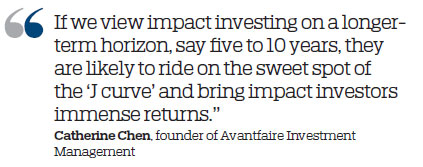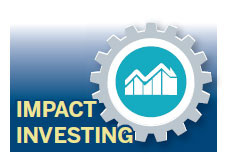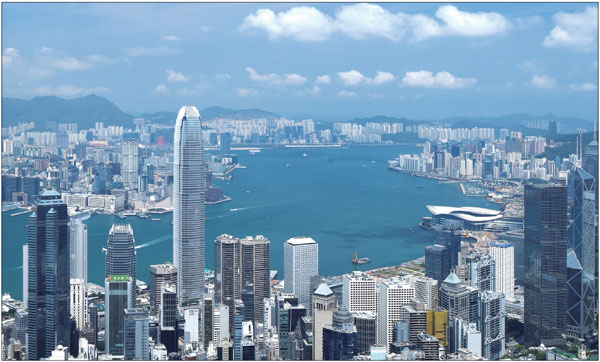Younger generation now harboring a different mindset regarding investment returns, benefits
As sprawling and widespread as it is today, impact investing – a hybrid of philanthropy and private equity – was by no means considered a mainstream instrument even several years ago.
At the dawn of a new investing era, a fresh mindset has settled in as the likes of millennial investors and next-generation family office managers began to view the concept of “investment” differently, according to Catherine Chen, founder of Avantfaire Investment Management – a private equity firm specializing in impact investing.
The younger generation of investors started to take social, environmental and other nonfinancial values into consideration and formed a more-comprehensive definition of “investment returns”, she said.
Chen is not the only expert who sees impact investing this way.
According to a report from the Forum for Sustainable and Responsible Investment (US SIF), sustainable and responsible investments have been growing across multiple regions and client segments throughout the last six years as the compound annual growth rate across some areas – including Europe, the US, Australia and Asia – increased by 15 percent from 2012 to 2016.
Additionally, the top concern of potential global risks have also shifted from “asset price collapse” of a decade ago, to “extreme weather events”, “natural disasters” and “failure of climate-change mitigation and adaptation”, according to the World Economic Forum’s Global Risks Report 2019.
Despite the robust growing momentum of impact investing, Chen said a false but common perception still exists that one cannot invest for financial returns and social benefits at the same time.
Such a perception particularly comes from investors focusing on investment strategies of traditional asset classes, whose view on creating social benefits is associated with donations or philanthropic acts. In Chen’s view, that mindset should be separated from financial investment.

A graduate of the Rotman School of Management in Toronto, Chen believes it is totally feasible to choose efficient investment strategies to achieve both a risk-adjusted financial return while making a social and environmental impact.
Chen views impact-investing markets as more tangible than most other financial markets. Impact investing is an investment type that allows investors to see the benefits they have actually created or what problems have been solved with their money, and therefore, this type of investment is easier for investors to understand.
Chen said her firm “walks the talk” in impact investing, embedding impact investing in the whole process to ensure that sourcing and screening, selection, due diligence, valuation and investment decision-making are all consistent with the purpose.
Such a paradigm shift of the investment concept, along with growing trends, will eventually adjust the distorted pricing of impact investment opportunities, Chen said.
“If we view impact investing on a longer-term horizon, say five to 10 years, they are likely to ride on the sweet spot of the ‘J curve’ and bring impact investors immense returns,” she said, suggesting that returns will spike after initial losses. “Over the long run, there won’t be any trade-offs.”
The US SIF report shows that while Europe and the United States have taken the lead in the past half-decade of growth in impact investing, Asia lags behind. The gap between the supply of the products and demand from investors is still wide.

Asia also has insufficient education about impact investing, and thus, inadequate familiarity with its benchmarks, measurement metrics, research and data, all of which make investment decisions harder to make. However, conditions in developed impact investing markets such as Canada, the US and Europe are quite the opposite.
Nevertheless, with the ever-increasing needs for social benefits in developing economies, especially in Asia, there seems to be a flow of attention coming to the region, as investors from the US and Europe have expressed an interest to weigh in with their capital to solve pain points lingering in Asia.
“Sometimes such pain points can be outside ‘SRI’ (socially responsible investing) and ‘ESG’ (environment, social and governance),” Chen said, adding that more complementary initiatives and standards are needed, along with relatively mature investment concepts such as SRI and ESG. Though not all-encompassing, both those existing frameworks have paved the way for the market to understand the broader definition of impact investing, she added.
Looking forward, Avantfaire plans to launch an impact investing private equity fund focusing on pre-Series-A and Series-A funding-round companies later in the year for professional investors, and also aims to explore opportunities in other fund of funds or single funds with Avantfaire’s overseas fund management partners in subsequent years.
The company also endeavors to make the impact investing ecosystem in Hong Kong thrive by collaborating with various parties such as investment partners, professional institutions, business chambers and local and overseas government agencies.
By Dai Kaiyi in Hong Kong(HK Edition)
[email protected]

Avantfaire Investment Management strives to promote the impact investing ecosystem in Hong Kong by collaborating with various parties such as investment partners, professional institutions, business chambers and local and overseas government agencies. Provided to China daily
(HK Edition 05/10/2019 page7)

